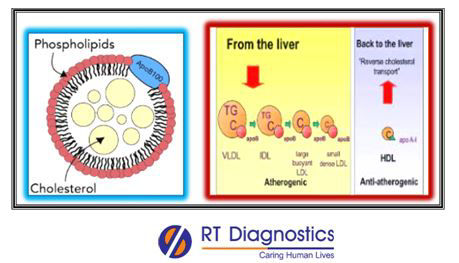APOLIPOPROTEIN –B:
Why Apolipoprotein B test?
CLINICAL INFORMATION :
Apolipoprotein Bor (Apo-B) test is used along with other lipid tests to help determine a patient’s risk of developing cardiovascular diseases. Apo B is a primarily integral apoprotein required for the formation of low-density lipoprotein – LDL (bad cholesterol). Apo B-100 serves as a signal for cellular binding and internalization of LDL particles by apo B/E receptors. Apolipoprotein-B is the primary Apo-lipoprotein of chylomicrons (Apo B-48), VLDL (Apo B-100), IDL, LDL (Apo B-100), and lp(a). Apo-B-48 is composed of 2521 amino acids and is essential for the formation of chylomicrons and Apo-B-48 is also responsible for the absorption of dietary fat from the intestine. Thus high levels of Apo-B can lead to plaques causing atherosclerosis and heart diseases. Clinical pre-requisite for Apo-B test are signs and symptoms of perfused sweating, heartburn or indigestion, arm pain, upper back pain, vague feeling of illness (generalized malaise), shortness of breath, headache, fullness or squeezing sensation of the chest, jaw pain, tooth pain or headache, nausea, vomiting along with epi-gastric discomfort, etc.

Sample Requirement: Specimen - Blood sample taken from the vein
Test Preparation: None
This Multi-Specialty Clinical Referral Laboratory RTDIAGNOSTICS provides precise and accurate tests with an extensive range of testing services to the medical centers to help in the diagnosis and identification of pathology in the test specimens for infectious diseases and also to evaluate the function of organ systems of the patient. It prevents further complications and helps to stabilize and restore health to near normalcy at the earliest without delay.



